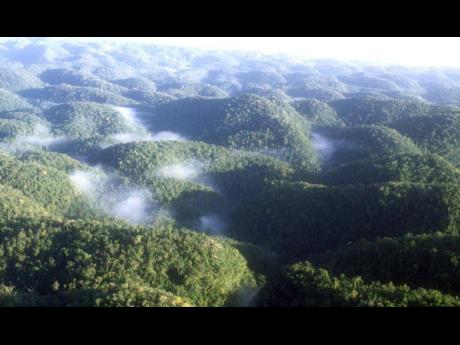Earth Today | Water woes a useful reminder to preserve Cockpit Country
AS JAMAICANS once again brace for water lock-offs, as part of the response to projected drought, one of the most important reasons to preserve the ecological gem that is the Cockpit Country is laid bare.
So says Suzanne Stanley, chief executive officer for the Jamaica Environment Trust.
“It is important to protect areas that are important to our water supply, areas like Cockpit Country that supply 40 per cent of western Jamaica with freshwater. It is important for us to protect those watersheds, those aquifers, those areas that are so vital for Jamaica’s water security,” she said.
And the value of the Cockpit Country – the subject of years-long debate on its protection – extends beyond safeguarding water security to its function as habitat for several diverse species, including bats, amphibians, the Jamaican Yellow Snake and the Giant Swallowtail Butterfly, among others. Among other things, it is also home to the maroons and a must-see for tourists keen on experiencing nature.
URGENCY NEEDED
Meanwhile, Stanley – whose 2008 dissertation at Oxford University in England was titled ‘Water Lock-off: The Creation of Water Scarcity in Portmore, St Catherine, Jamaica’ – said Jamaica needed to deal urgently with institutional challenges that threaten to undermine water security.
“At that time (of studying), I realised that there were lots of different factors contributing to water scarcity in Jamaica. Yes, there is the (quantity of) rainfall issue and yes, there is the issue of where the people are versus where the water is; and other physical factors that will be exacerbated by climate change. However, it is about reconciling the physical constraints with the institutional constraints and addressing the institutional issues which would alleviate some of these problems,” she said.
“From just a very practical standpoint, our storage capacity in Kingston now, compared to our population, is not where it needs to be. So we have these two reservoirs that were built to serve a very different size population. And yes, people have recognised their capacity for storage but there is not a requirement to have this kind of water storage when we are building new developments and we are building all these high rises. How are these new residential developments going to be supplied if we have not increased our capacity?”
Only last week, her sentiment was echoed by Eleanor Jones, who heads the consultancy firm Environmental Solutions Limited.
“The issue of climate change has been with us and we have been talking. We have been talking about the longer droughts and warming temperatures which increase evaporation for what we do have and it seems that, yes, every year we have, water lock-offs and it is frustrating. The fact is that issue is much larger than the National Water Commission (and the water lock-offs),” she said at the time.
“Do we understand, for example, that as a municipal council, we have a responsibility to ensure that we have the appropriate infrastructure to support all of the permits we are giving to have multiple units that are occupying single units? Where there was one house, there are now 10, etc. We cannot expect the National Water Commission to wave a magic wand to have the supply to meet these demands that have not been considered where water supply is concerned,” Jones added.


